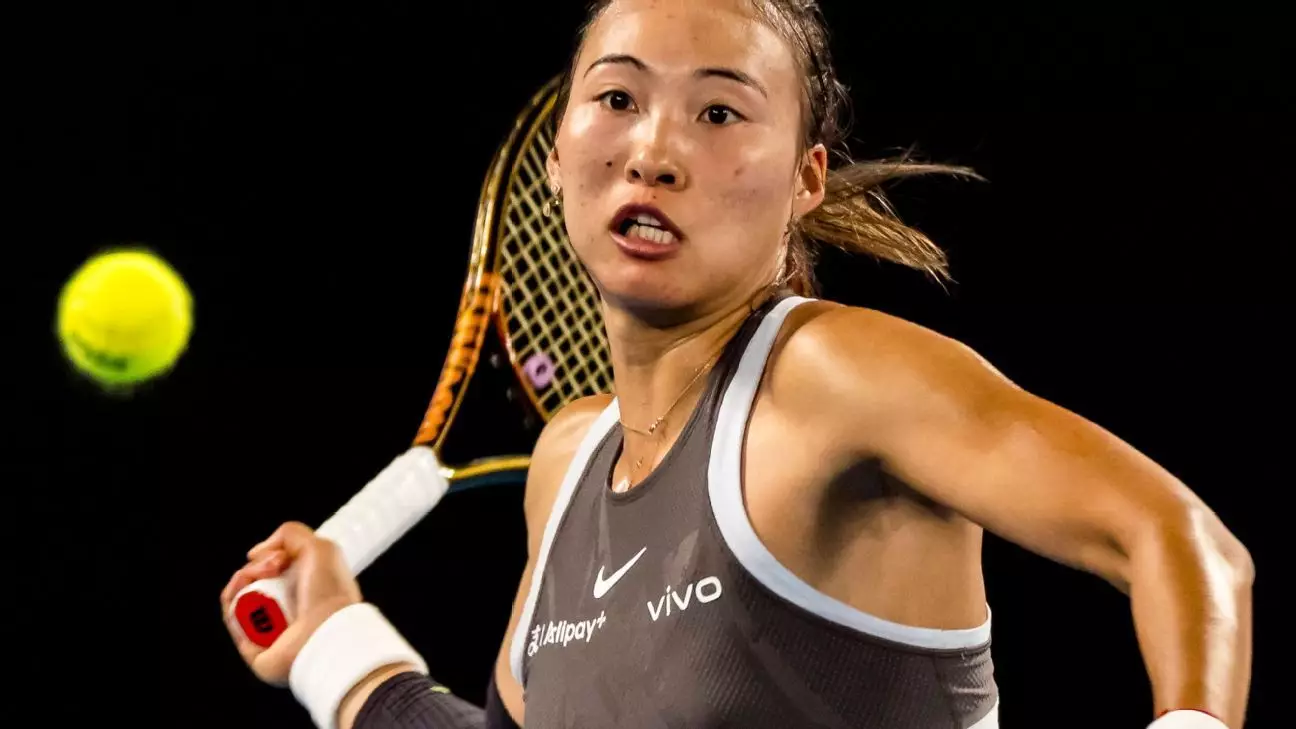Zheng Qinwen’s journey through the world of tennis has been nothing short of remarkable, especially in the year leading up to the Australian Open. A year ago, she arrived at Melbourne Park with a modest résumé and a hunger for success that was palpable. Fast forward twelve months, and she stands not just as a participant but as a seasoned competitor, having clinched a runner-up position at the Australian Open and an Olympic gold medal for China. Such achievements, while impressive, could not mask the nerves she felt before stepping onto the iconic Rod Laver Arena—an arena that had been both a stage of triumph and a platform for growth in her budding career.
Despite her elevated status, Zheng remarked, “Actually, I feel really nervous.” This admission speaks volumes about the pressure athletes feel when the stakes are high, especially in a tournament renowned for its intensity and prestige. Her seed position—No. 5—was a testament to her hard work, yet it seemed to amplify the expectations that weighed heavily on her shoulders.
Zheng’s first-round match was not without its struggles. Facing Anca Todoni, a relatively inexperienced qualifier from Romania, Zheng encountered a rocky start, battling not only her opponent but the stormy Melbourne weather. The match began with Zheng showing signs of nervousness, even as she served for the first set at 5-4, only to see Todoni challenge her with persistence. Ultimately, Zheng found a way to secure the first set in a tiebreak, showcasing her resilience. The second set proved to be a different story, where Zheng dominated and sealed a 7-6 (3), 6-1 victory.
The complexity of her emotions was laid bare when she reflected on the dizzying mix of enthusiasm and fear she felt leading up to her match. “Being nervous usually makes me focus better,” she noted. However, her comments suggest a recognition that nerves may have hampered her performance, at least initially. This insight not only highlights the psychological intricacies involved in competitive sports but also emphasizes how the most seasoned players still grapple with self-doubt.
It is important to recognize the pivotal role that the Australian Open has played in Zheng’s career development. This is the same tournament where, a year prior, she astonished audiences with her striking power and advanced all the way to the finals before losing to Aryna Sabalenka. The Melbourne courts, particularly conducive to her big-hitting style, have become a crucible for her growth. Moreover, the added layer of playing under a closed roof during the inclement weather this year provided both challenges and comfort, reinforcing her adaptability in high-pressure situations.
The atmosphere in Melbourne is distinguishable; the anticipation and excitement surrounding each match create a unique energy that even seasoned competitors can feel acutely. Zheng’s success at the Paris Games in August has undoubtedly added to the weight of expectation she carries, transforming her from an underdog to a contender. Understanding this trajectory becomes crucial in appreciating not just her achievements, but the path she took to reach them.
Zheng’s match was part of a broader narrative at the Australian Open, which has adopted a more extended schedule, allowing players a chance to negotiate their nerves and physical demands more manageable. In a fresh twist on the classic tournament format, the first round now spans over three days, promoting recovery and reducing the risk of injuries—a much-needed adaptation in the high-octane world of professional tennis.
The opening day of the tournament also garnered attention for its upsets and emerging talents, as seen in Hady Habib’s historical win. The Lebanese athlete’s victory signaled a shift in representation and diversity within tennis, as he made headlines not only for himself but for an entire nation. Such narratives serve to enrich the sporting spectacle, reminding fans and players alike of the many stories that unfold on the international stage.
Looking Ahead: The Future of Zheng and the Tournament
As Zheng moves forward in the tournament, the mix of excitement and anxiety will continue to accompany her. Each match has the potential to reshape her identity as a player. It will be crucial for her to find a way to channel her jitters into positive energy, enabling her to tap into the power that brought her success in the prior year.
In the ever-changing landscape of tennis, where both talent and mental fortitude are paramount, Zheng Qinwen represents the future. Her trajectory from a nervous rookie to a recognized contender exemplifies the growth and maturation inherent in the sport. With a promising year ahead, fans will undoubtedly be eager to see how she climbs the ranks and faces the challenges ahead in the subsequent rounds at the Australian Open.


Leave a Reply